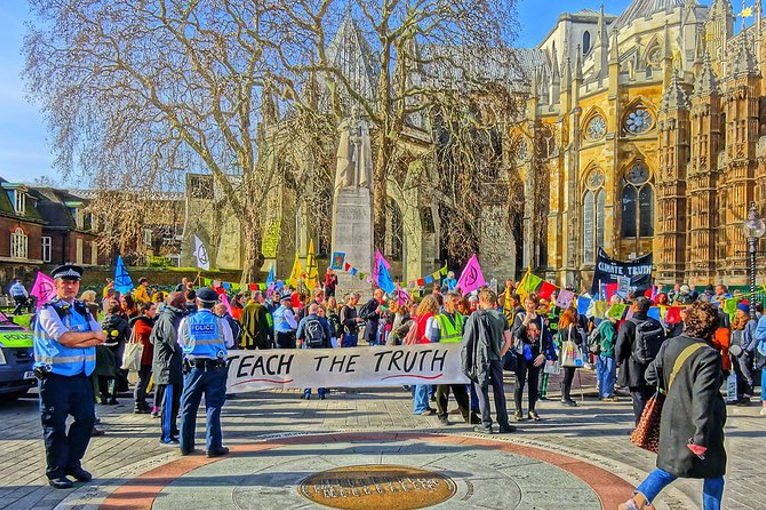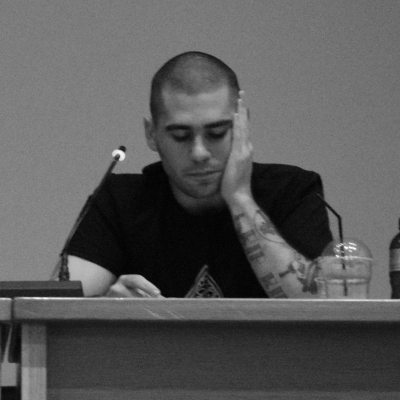The attraction of evil and crime for the mob mentality is nothing new. It has always been true that the mob will greet “deeds of violence with admiring remark: it may be mean but it is very clever.-Hannah Arendt[1]
Among opponents of direct democracy there is this reoccurring argument of it being prone to the so-called “mob rule”[2], as if the people, once empowered, will most probably turn into a mob. But this line of thought, deeply submerged into oligarchic imaginary, is highly fallacious and deceptive. There are certain reasons because of which the people can degrade into mob, and Hanna Arendt’s work can provide clarity into distinguishing the former from the latter, as well as alternative civic routs that can lead to the emergence of an active citizenry instead.
The Characteristics of the Mob
Arendt begins with stating that it is fundamentally wrong to regard the mob as identical with rather than as caricature of the people.[3] It is only one possible form of the latter, and not its supposed “inner-self” that waits to be unleashed. Instead, Arendt suggests that the mob, with its “enlarged tribal consciousness”, resembles much rather a “race”,[4] which is an extreme and totalitarian-leaning identity that the people can take. As such it is inherently attracted to violence. In this sense, we can suggest that the mob is anti-political, as it, according to Arendt, attempts to substitute power for strength.[5]
It is only logical then that the mob will search for and stand behind the “strong man,” the “great leader”. This is a characteristic of great differentiation from another tendency that large swaths of people have exhibited during all great revolutions — that of the fight for true, direct participation. If the second is an expression of genuine social life, then, according to Arendt, the former expresses the hate for society from which the mob feels excluded.[6]
The authoritarian tendency of mob mentality is enforced by a mixture of gullibility and cynicism, which has proven so effective for the rise of totalitarian movements. Arendt points at how
totalitarian mass leaders based their propaganda on the correct psychological assumption that, under such conditions, one could make people believe the most fantastic statements one day, and trust that if the next day they were given irrefutable proof of their falsehood, they would take refuge in cynicism; instead of deserting the leaders who had lied to them, they would protest that they had known all along that the statement was a lie and would admire the leaders for their superior tactical cleverness.[7]
Ultimately, mob mentality is all about thirst for authority. What unites all those who constitute mob-like movements is, for Arendt, the promise that each of its members could become such a lofty all-important walking embodiment of something ideal if he would only join it.[8] She characterizes correctly such authoritarian tendencies as the underworld of the bourgeois class,[9] where everyone is ready to exploit popular anger and desperation in order to get herself/himself into power.
The Mob and the Plebiscite Republic
Nowadays we have often heard of authoritarian leaders speaking of direct democracy, when trying to underline their mass popularity. What they really mean however has nothing to do with any genuine form of democratic experience, as this would indicate the unmediated involvement of every single member of society in public affairs. Instead, Arendt suggests, they advance the procedure of plebiscites (or referendums), which is an old concept of politicians who rely upon the mob,[10] as it rests upon people responding en masse to pre-formulated questions and then leaving those in power to implement in practice their own interpretation of the result.
The referendum is not a new addition to the political arsenal of authoritarian movements. 19th century politician Paul Déroulède, one of the founders of the French nationalist Ligue des Patriotes, envisioned a “plebiscite republic”, where the president will be elected into power by universal suffrage, and the popular will would be expressed through “legislative plebiscites”.[11 In one such setting at the core of the system is not the direct popular deliberation, but the head of nation, whose decisions, at times, are brought in a manipulative manner to the public for ratification.
It is clear that in this case there is no genuine form of citizenship present. Instead, we have a system based entirely on mob mentality, where an authoritarian movement, with an utmost devotion, elevates its leader, with the hope that each of its individual members will get a grip of at least a little bit of privilege over the rest of society. The usage of plebiscite in such cases comes as an ideological cover of a semi-totalitarian experiences, and has nothing to do with democracy.
Beyond the Mob: Creating Spaces for Citizenship
The problem with our current political system, with its alienating and passive form of governance, is that it provides certain preconditions for potential degradations of the people into mobs. Unfortunately, however, it does not do the same with the elevation of people into citizens — a vital element for direct democracy. Citizenship must be understood as the exact opposite of mob mentality: if the latter indicates the lowest human drive towards centralization of authority in the hands of a certain section of society, then the former is the sweeping distribution of power among all and the establishment of a political architecture of radical equality. It is an inseparable ingredient for freedom as a political phenomenon, whose roots can be traced back to the emergence of the Athenian polis and the first germs of direct democracy.
Arendt explains that the current regime of representative parliamentarism (today fallaciously dubbed representative “democracy” — an oxymoron)
could not save the people from lethargy and inattention to public business, since [it] provided a public space only for the representatives of the people, and not for the people themselves.[12]
In other words, with the exception of the ruling class, the rest of society has no access to the political processes that shape the direction their society is to take. One might object, by pointing to electoral procedures that usually take place once every several years, reminded by the famous words of Jean-Jacques Rousseau that in such regimes people are free only during the election of members of parliament.[13] But there is a more than convincing correction to that thought offered by Cornelius Castoriadis, according to whom the subjects of such regimes are not free even on election day, as their decisions have been prescribed by political parties, the propaganda industry, and other factors long before their visit to the ballot box.[14]
For Arendt, citizenship is something that is practiced[15], and as such it requires a proper public space. According to her, danger for the emergence of authoritarian tendencies emerges from settings, such as the one we have today, where certain degree of liberty is given to the people in their private capacity but there is no space established for them in their capacity of being citizens.[16] In this sense, political participation is spatially limited, since it is not universally valid, but becomes reality only when a majority of the people applies it. The active practice of citizenship by the people in the public affairs of their communities provides them not only with the experience of public freedom, but also with a sense of political and genuinely civic agency.
A suitable space where the people can act, and turn into, active citizens are the institutions of direct democracy, such as the popular council and the public assembly. For Arendt, councils are the best instruments for breaking up the modern mass society, with its dangerous tendency toward the formation of pseudo-political mass movements.[17] Such popular democratic institutions are invaluable for the creation of vital citizenship as they are the only political organs where party membership plays no role whatsoever, and are in fact spaces for people to act without intermediaries. It is for this reason, as Arendt notes, that the councils of direct democracy will always be in conflict with parliaments as well as with ‘constituent assemblies’, for the simple reason that the latter, even in their most extreme wings are still the children of the party system.[18]
Unlike others who, from fear of the rise of the excessive mob, seek to erect even more barriers to keep the masses from political power, Arendt concludes that the only remedies against the misuse of public power by private individuals lie in the public realm itself.[19] In other words, the best solution to authoritarianism is the establishment of a political setting in which all members of society have an equal share in power and can collectively put limits to excessive and oligarchic attitudes.
Conclusion
Much time has passed since the publication of Arendt’s The Origins of Totalitarianism back in 1951, but the danger of authoritarianism is still present. The liberal oligarchic environment of the current representative regimes provides fertile ground for the emergence of mob-like tendencies that advance totalitarian projects and autarchic leaders. But such authoritarian movements are not an inevitable form of the people. Instead, they are a by-product of a system that denies the right to genuine political participation to the vast majority of society. It is this state of generalized disempowerment that drives the emergence of mobs. An antidote to such totalitarian tendencies is the creation of genuine public space, where a spatiality is provided for the emergence of another form of the people — that of the citizen. The exercise of citizenship, according to Arendt, is one of the best antidotes to authoritarian attitudes. It is only by means of direct political participation, that is, by engaging in common action and collective deliberation, that citizenship can be reaffirmed and political agency effectively exercised.
[1] Hannah Arendt: The Origins of Totalitarianism (London: Harcourt, 1973), p307
[2] https://thehill.com/opinion/campaign/413142-the-united-states-is-not-a-democracy-and-it-wasnt-meant-to-be-one
[3] Hannah Arendt: The Origins of Totalitarianism (London: Harcourt, 1973), p107
[4] Hannah Arendt: The Origins of Totalitarianism (London: Harcourt, 1973), p238
[5] Hannah Arendt: The Human Condition (London: The University of Chicago Press, 1998), p203
[6] Hannah Arendt: The Origins of Totalitarianism (London: Harcourt, 1973), p107
[7] Hannah Arendt: The Origins of Totalitarianism (London: Harcourt, 1973), p382
[8] Hannah Arendt: The Origins of Totalitarianism (London: Harcourt, 1973), p249
[9] Hannah Arendt: The Origins of Totalitarianism (London: Harcourt, 1973), p337
[10] Hannah Arendt: The Origins of Totalitarianism (London: Harcourt, 1973), p107
[11] Jean-Yves Camus & Nicolas Lebourg: Far-Right Politics In Europe (Cambridge: The Belknap Press, 2017), p12
[12] Hannah Arendt: On Revolution (New York: Penguin Books, 2006), p230
[13] Jean-Jacques Rousseau: The Social Contract
[14] http://www.athene.antenna.nl/ARCHIEF/NR01-Athene/02-Probl.-e.html
[15] https://plato.stanford.edu/entries/arendt/#AreConCit
[16] Hannah Arendt: On Revolution (New York: Penguin Books, 2006), p245
[17] Hannah Arendt: On Revolution (New York: Penguin Books, 2006), p271
[18] Hannah Arendt: On Revolution (New York: Penguin Books, 2006), pp255–256
[19] Hannah Arendt: On Revolution (New York: Penguin Books, 2006), p245
Teaser photo credit: Extinction Rebellion Tell the Truth Protest, London February 22 2019. David Holt via Wikimedia Commons. CC BY 2.0.






